Art, demopraxy, design, magic and pretence: these are some of the themes dealt with in the course of the latest UNIDEE module, developed through the contributions of different speakers and lecturers. The initiative was held in the spaces of Fondazione Pistoletto, and organized by Cittadellarte in collaboration and in co-planning with the Linnaeus University. The programme, characterised by an exchange of tutors between the two institutions, officially started on the evening of 4th April, with the actual activities beginning the following morning. The module was conceived as a retreat dedicated to the world of art: the students temporarily left their classrooms to move to a different context. In the dimension of Cittadellarte, they had the opportunity to concentrate on their individual researches, also operating as study groups. In an environment governed by new dynamics, the youths could interact with tutors and guests, there to enhance their educational experience. “Retreats with universities – explains Valerio Del Baglivo, UNIDEE’s visiting curator – allow us to provide an immersive experience away from the classroom. The participating designers, for example, moved out of a scholastic institution to enter an art organisation like ours, which gave them the opportunity to concentrate on themselves and shift their perspectives on many aspects, like times, context and rules”.
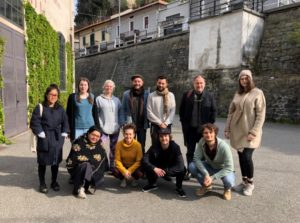
The group of participants with Valerio Del Baglivo and Adrian Paci (third and second standing from the right respectively).
On Friday, after a guided tour to explore the spaces of the Biellese foundation and discover the peculiarities of Michelangelo Pistoletto’s works, was the opening talk by Paolo Naldini, director of Cittadellarte, called Cittadellarte’s experiments and practices in Social Design. The Demo-praxis prototypes. The activities of the six students participating in the master’s course Design + Change – coordinated by Valerio Del Baglivo – continued in the afternoon with a Skype lecture by Federico Campagna, who presented and discussed the contents of his book Technic and Magic: The Reconstruction of Reality (a philosophical work in which the author has highlighted the process of construction and pretence of reality). Campagna is an Italian philosopher living and working in London (he is a lecturer and tutor at the Royal College of Art), and his main research field is the connection between metaphysics, cultural production and politics.
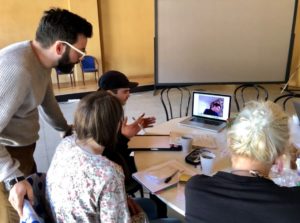
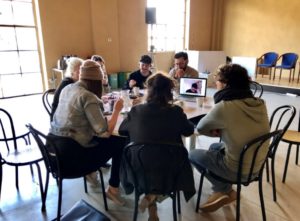
Two moments from the Skype lecture with Federico Campagna.
After the Skype lecture, the students attended a conference curated by Adrian Paci (the mentor of two past UNIDEE modules, in 2016 and 2017), who presented his artistic practice. Paci talked about how his work addresses one of the paradoxes of human intelligence, i.e. becoming aware of reality through the unreal. “In 1997 – we read in UNIDEE’s notes about the life of the artist – Adrian Paci escaped from violent riots in Albania to find refuge, with his family, in Italy. On arriving in the country, he temporarily abandoned painting and sculpture in favour of video making, thus exploring new cinematographic languages and expressive means. The experience of being in exile, the shock of the separation and his having to adapt to a new place defined the context of his first films, through which he tried to discover the roots of his past. Gradually, Adrian Paci took distance from his personal experience to deal with collective history through projects stressing the consequences of conflicts and social revolutions, revealing how one’s identity is affected by the socio-economical context. Working with non-professional actors, men and women in difficulty, he investigates many of the existential and social problems of our time: migration, loss, uprooting, globalisation, cultural identity, nostalgia and memory.”
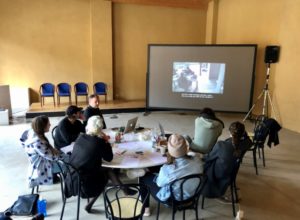
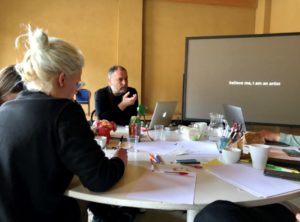
Two moments from the talk with Adrian Paci.
The next phase of the module took place on Saturday morning, with two workshops curated by Zeenath Hasan and Ola Ståhl, called Fictioning and Towards a Post-Anthropocentric Speculative Archaeology through Design. 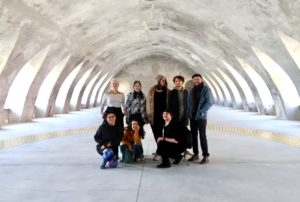 In the afternoon, the programme again involved Adrian Paci, who engaged in a dialogue with the young designers about the meaning of being creatives and artists: “Paci talked in particular about the possibility of producing intensities (as a poetic concept) and the personal reasons leading people to be artists, – Valerio Del Baglivo said to us – he explained how a work not only needs to be well made, it’s also essential that it communicates a strong message, shining with its own light. Adrian’s work is not only about his daily life and professional story, but also about his past as a migrant. He has in fact transformed these events into his artist’s films”. The last gathering the students participated in was on Sunday, and it was a lesson curated by Jenny Lee, lecturer in the Speculative Design course at the Linnaeus University. “This module – Del Baglivo concludes – was important for us because it re-tested the model of the institutional retreat. I am extremely satisfied, because the students took part in an educational experience right before getting involved in Milan’s Design Week. The balance was definitely positive: the multi-thematic discussions with the lecturers were animated and the students very much involved in them”.
In the afternoon, the programme again involved Adrian Paci, who engaged in a dialogue with the young designers about the meaning of being creatives and artists: “Paci talked in particular about the possibility of producing intensities (as a poetic concept) and the personal reasons leading people to be artists, – Valerio Del Baglivo said to us – he explained how a work not only needs to be well made, it’s also essential that it communicates a strong message, shining with its own light. Adrian’s work is not only about his daily life and professional story, but also about his past as a migrant. He has in fact transformed these events into his artist’s films”. The last gathering the students participated in was on Sunday, and it was a lesson curated by Jenny Lee, lecturer in the Speculative Design course at the Linnaeus University. “This module – Del Baglivo concludes – was important for us because it re-tested the model of the institutional retreat. I am extremely satisfied, because the students took part in an educational experience right before getting involved in Milan’s Design Week. The balance was definitely positive: the multi-thematic discussions with the lecturers were animated and the students very much involved in them”.

